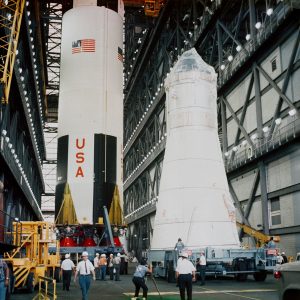Miami, Jun 26 (EFE).– A new documentary is taking a fresh look at NASA’s Apollo program, focusing on the approximately 400,000 people who worked to put a man on the Moon 50 years ago.
Filmmaker Zachary Weil decided not to make Neil Armstrong, Michael Collins and Buzz Aldrin, the crew of the Apolo 11 mission that flew to the Moon in July 1969, the subjects of the documentary.
Instead, “When We Were Apollo” looks at the people who made it possible for Armstrong and Aldrin to land on the Moon on July 20, 1969.

The 37-year-old Weil chose the anonymous people who made it possible for Apollo to successfully complete its objective as the subject of his first film, which was screened on Tuesday at Miami’s Phillip and Patricia Frost Museum of Science.
The film will also be shown on Wednesday in Cocoa Beach, a city located near Cape Canaveral, where Apollo 11 began its journey to the Moon.
“When We Were Apollo” will be aired by Public Broadcasting System (PBS) stations before making the festival circuit and becoming available on Amazon Prime’s streaming service.
The filmmaker selected a 19-person group – two women and 17 men – to represent the 400,000 people who made Apollo possible, allowing them to tell their stories.
John Filson, who produced the documentary, told EFE that Weil wanted to give the unknown people who made Apollo a success the credit they were due for helping win the space race with the Soviet Union.
The team used three rounds of funding on crowdfunding platform Kickstarter to get the production off the ground, receiving $25,926 from 304 people.
Filson and Weil also got a grant from a foundation in Alabama, where the Saturn V rocket that launched Apollo 11 to the Moon from Launch Complex 39 at the Kennedy Space Center on July 16, 1969, was built.
The documentary cost about $100,000 to make and introduces new generations to an achievement that has not lost its luster in 50 years.
Some of the people featured in the film donated money to Contact Light Films to help produce “When We Were Apollo,” Filson told EFE.
The film shows the pride that those worked on the Apollo program still feel about their accomplishments, Filson said.
